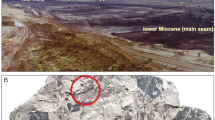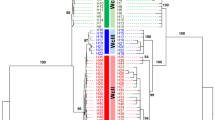Abstract
THE distribution and rate of spread of the immigrant intertidal barnacle Elminius modestus Darwin in the British Isles and in the rest of north-west Europe have been summarized recently1. The most northerly published record is that of Connell2, who found a single specimen of Elminius on Farland Point, Isle of Cumbrae, on March 7, 1955; the nearest published records to this are those for Stranraer and Kirkcolm in Loch Ryan1, about 55 miles to the south.
This is a preview of subscription content, access via your institution
Access options
Subscribe to this journal
Receive 51 print issues and online access
$199.00 per year
only $3.90 per issue
Buy this article
- Purchase on Springer Link
- Instant access to full article PDF
Prices may be subject to local taxes which are calculated during checkout
Similar content being viewed by others
References
Crisp, D. J., J. Mar. Biol. Assoc., U.K., 37, 483 (1958).
Connell, J. H., Nature, 175, 954 (1955).
Author information
Authors and Affiliations
Rights and permissions
About this article
Cite this article
POWELL, H. Elminius modestus Darwin on the Isle of Cumbrae (Firth of Clyde). Nature 185, 119–120 (1960). https://doi.org/10.1038/185119b0
Issue Date:
DOI: https://doi.org/10.1038/185119b0
This article is cited by
-
Effects of temperature and salinity on larval development ofElminius modestus (Crustacea, Cirripedia) from Helgoland (North Sea) and New Zealand
Helgoländer Meeresuntersuchungen (1986)
-
Northern Limits of Elminius modestus in Britain
Nature (1960)
Comments
By submitting a comment you agree to abide by our Terms and Community Guidelines. If you find something abusive or that does not comply with our terms or guidelines please flag it as inappropriate.



